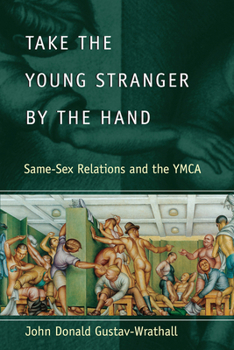Take the Young Stranger by the Hand: Same-Sex Relations and the YMCA
Select Format
Select Condition 
Book Overview
Now associated with family health clubs, the YMCA's bland image is the result of relentless outreach and the studied avoidance of controversy. But, as John Gustav-Wrathall shows in his revealing social history of the organization, the life of the YMCA has been filled with strife, tragedy, and irony, a life that itself reflects the struggle over the shifting societal mores regarding masculine friendship and intimacy. Take the Young Stranger by the...
Format:Paperback
Language:English
ISBN:0226907856
ISBN13:9780226907857
Release Date:June 2000
Publisher:University of Chicago Press
Length:288 Pages
Weight:0.90 lbs.
Dimensions:0.7" x 6.1" x 9.0"
Customer Reviews
2 ratings
It's much more than 'swim and gym'
Published by Thriftbooks.com User , 19 years ago
Because I have grown up in a heterosocial era, John Donald Gustav-Wrathall's study of the Young Men's Christian Association was especially fascinating. Sure I've heard the Village People's infamous song many times over, but I had not previously imagined how complex these relationships were---or explored all reasons for the "Y"'s comparative decline as a homosocial/homosexual cruising site. Allegedly to avoid clogging the swimming pools with their cotton swim suits, many men at the "Y" simply elected to swim nude. Not attaching anything sexual to the action, both the men and the organization accepted it as a matter of fact that men would see each other naked at the "Y". The tension between people who wanted to keep things as they were and those who wanted the organization to project a 'family image' (hence the designation of "Family Y's" in post-war America) rivals any dramatic work which I've seen thus far. Considering the 'intense relationships' which they formed as consequence of working in the 'Y' movement, I also found it odd that some people in the YMCA would accuse their counterparts in the Young Women's Christian Association of being lesbians. These men had apparently absorbed the double-standards of their own day which negated women's public sphere influence. The admission of women as members into the previously all-male realm of the Y was also interesting. This move was another tactic to convince people---inside and outside the organization---nothing improper was happening. During it's history, the organization also faced criticisms of it's program. In 1912, the Portland, Oregon YMCA, with the ninth largest membership in North America, became the center of a sex scandal. A Portland newspaper charged many of the city's most prominent men with sodomy and delinquency of minors. A few of the implicated men lived at the YMCA and others used the sports facilities. This was the first time that a connection between the YMCA and homosexuality was publicly made. The organization continued struggling with the issue of homosexuality, but their 'front lines'--the desk clerks allegedly supposed to guard against homosexuality---looked the other way. In this closeted era, the YMCA was a critical meeting space for 'queer' young men. For all of the critical perspective, the book does praise it's subject. The "Y" pioneered racial unity AND sex education in an era when even many secular organizations lacked courage to even consider taking on the issue. I was especially heartened by the advocay of factually-based sex education, myself living in an era when so many other organizations with 'Christian' in their name actually advocate that people not have access to any of this information. How refreshing to read of an alternative---and in a much earlier era too! This book is part of the Chicago series on Sexuality, History and Society, but people wanting to read about YMCA history would also find it interesting because the authors have used
YMCA, It 's More Than Just A Song
Published by Thriftbooks.com User , 23 years ago
John Donald Gustav-Wrathall's study of same-sex relations and the YMCA, Take the Young Stranger by the Hand, is a very focused study taking the reader from the origins of the YMCA, with its plethora of bachelor secretaries and intense friendships through the early decades of the twentienth century and its fear of deviancy and into the cruising of later decades. To be sure, the bulk of the book is on the earlier and middle periods. Two of the chapters also focus on women to some extent. It is interesting to see how the YMCA came into being and how its development echoed the social development of the society it was a part of and, even more fascinating, the ways in which it tried to influence society. This book fits into homosexual history but is broader in contexst than that as it is truly the history of same-sex relations, including sexual, but also including friendship and mentoring and sometimes comibinations of all three. It is the story of the changing homosocial environment all people of a certain class (middle) lived within.






